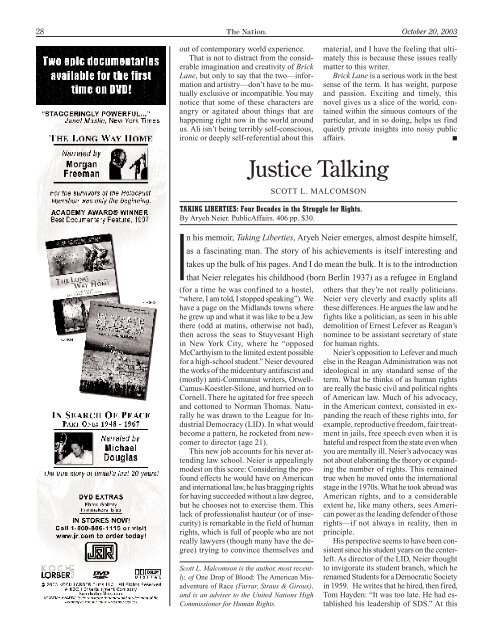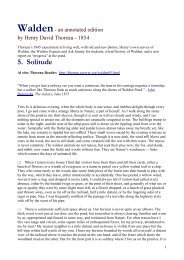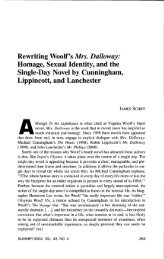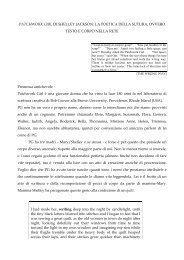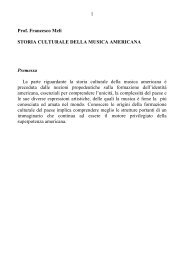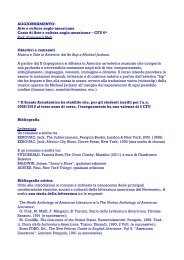London Kills Me - Paola Carbone
London Kills Me - Paola Carbone
London Kills Me - Paola Carbone
Create successful ePaper yourself
Turn your PDF publications into a flip-book with our unique Google optimized e-Paper software.
28 The Nation. October 20, 2003<br />
out of contemporary world experience.<br />
That is not to distract from the considerable<br />
imagination and creativity of Brick<br />
Lane, but only to say that the two—information<br />
and artistry—don’t have to be mutually<br />
exclusive or incompatible. You may<br />
notice that some of these characters are<br />
angry or agitated about things that are<br />
happening right now in the world around<br />
us. Ali isn’t being terribly self-conscious,<br />
ironic or deeply self-referential about this<br />
material, and I have the feeling that ultimately<br />
this is because these issues really<br />
matter to this writer.<br />
Brick Lane is a serious work in the best<br />
sense of the term. It has weight, purpose<br />
and passion. Exciting and timely, this<br />
novel gives us a slice of the world, contained<br />
within the sinuous contours of the<br />
particular, and in so doing, helps us find<br />
quietly private insights into noisy public<br />
affairs.<br />
■<br />
Justice Talking<br />
SCOTT L. MALCOMSON<br />
TAKING LIBERTIES: Four Decades in the Struggle for Rights.<br />
By Aryeh Neier. PublicAffairs. 406 pp. $30.<br />
In his memoir, Taking Liberties, Aryeh Neier emerges, almost despite himself,<br />
as a fascinating man. The story of his achievements is itself interesting and<br />
takes up the bulk of his pages. And I do mean the bulk. It is to the introduction<br />
that Neier relegates his childhood (born Berlin 1937) as a refugee in England<br />
(for a time he was confined to a hostel,<br />
“where, I am told, I stopped speaking”). We<br />
have a page on the Midlands towns where<br />
he grew up and what it was like to be a Jew<br />
there (odd at matins, otherwise not bad),<br />
then across the seas to Stuyvesant High<br />
in New York City, where he “opposed<br />
McCarthyism to the limited extent possible<br />
for a high-school student.” Neier devoured<br />
the works of the midcentury antifascist and<br />
(mostly) anti-Communist writers, Orwell-<br />
Camus-Koestler-Silone, and hurried on to<br />
Cornell. There he agitated for free speech<br />
and cottoned to Norman Thomas. Naturally<br />
he was drawn to the League for Industrial<br />
Democracy (LID). In what would<br />
become a pattern, he rocketed from newcomer<br />
to director (age 21).<br />
This new job accounts for his never attending<br />
law school. Neier is appealingly<br />
modest on this score: Considering the profound<br />
effects he would have on American<br />
and international law, he has bragging rights<br />
for having succeeded without a law degree,<br />
but he chooses not to exercise them. This<br />
lack of professionalist hauteur (or of insecurity)<br />
is remarkable in the field of human<br />
rights, which is full of people who are not<br />
really lawyers (though many have the degree)<br />
trying to convince themselves and<br />
Scott L. Malcomson is the author, most recently,<br />
of One Drop of Blood: The American Misadventure<br />
of Race (Farrar, Straus & Giroux),<br />
and is an adviser to the United Nations High<br />
Commissioner for Human Rights.<br />
others that they’re not really politicians.<br />
Neier very cleverly and exactly splits all<br />
these differences. He argues the law and he<br />
fights like a politician, as seen in his able<br />
demolition of Ernest Lefever as Reagan’s<br />
nominee to be assistant secretary of state<br />
for human rights.<br />
Neier’s opposition to Lefever and much<br />
else in the Reagan Administration was not<br />
ideological in any standard sense of the<br />
term. What he thinks of as human rights<br />
are really the basic civil and political rights<br />
of American law. Much of his advocacy,<br />
in the American context, consisted in expanding<br />
the reach of these rights into, for<br />
example, reproductive freedom, fair treatment<br />
in jails, free speech even when it is<br />
hateful and respect from the state even when<br />
you are mentally ill. Neier’s advocacy was<br />
not about elaborating the theory or expanding<br />
the number of rights. This remained<br />
true when he moved onto the international<br />
stage in the 1970s. What he took abroad was<br />
American rights, and to a considerable<br />
extent he, like many others, sees American<br />
power as the leading defender of those<br />
rights—if not always in reality, then in<br />
principle.<br />
His perspective seems to have been consistent<br />
since his student years on the centerleft.<br />
As director of the LID, Neier thought<br />
to invigorate its student branch, which he<br />
renamed Students for a Democratic Society<br />
in 1959. He writes that he hired, then fired,<br />
Tom Hayden: “It was too late. He had established<br />
his leadership of SDS.” At this


